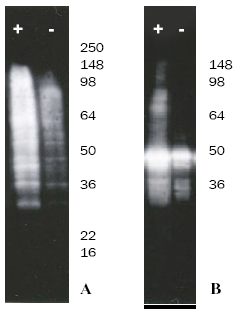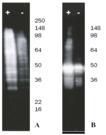For the generation of ubiquitin conjugated proteins. HeLa S100 lysate facilitates controlled ubiquitin conjugation of substrate proteins (exogenous or endogenous) of interest through the ubiquitin cascade. Conjugate formation can be detected and monitored by Western blotting using the highly sensitive ubiquitin-conjugate specific antibody supplied and/or antibodies for specific target proteins. Modified proteins can be subjected to further purification prior to their use in subsequent experiments if required. Suggested uses: Generation of ubiquitin conjugated proteins. Exogenous or endogenous HeLa lysate proteins (tagged/radio-labeled/immuno-detectable) can be ubiquitinylated followed by immediate detection/analysis. Subsequent analysis could include proteasomal degradation, ubiquitin modification site mapping (by mass spectrometry), and the effect of ubiquitin modification on enzyme interactions, activity and function, Ubiquitinylation of proteins of interest from cell or tissue extracts, Modification of proteins using ubiquitin derivatives or ubiquitin mutants for improved detection, analysis or investigation of alternative (non-proteasomal) ubiquitin signaling pathways.

Figure: Western blot of S100 ubiquitin conjugation assays of both endogenous lysate and exogenously added p53 proteins. Assays set-up and run as described in “Assay protocol” section. Ubiquitin-protein conjugate formation was detected by Western blotting of assays for A: General ubiquitinylation of endogenous HeLa S100 lysate proteins using the supplied FK2 ubiquitin-conjugate specific antibody (PW8810) or B: specific modification of p53 present in HeLa S100 lysate using p53 specific monoclonal antibody DO-7 (Prod. No. BML-PW1095) as described in “Analysis by Western blotting”. Results demonstrate the utility of the HeLa conjugation kit for both the ubiquitin modification of endogenous S100 lysate proteins in general and of specific endogenous proteins of interest, such as p53. The elevated level (A) or formation (B) of ubiquitin modified proteins can be clearly seen in the +ve (ATP containing)assays. The lower level (A) or absence (B) of ubiquitin conjugated proteins in –ve control reactions (-ATP) demonstrates that their formation is ATP-dependent (required for E1 activation) and, hence, derived from the ubiquitin cascade.
Please mouse over
Product Details
| Application Notes: | Uses:
1. Ubiquitinylation of specific endogenous HeLa lysate proteins, followed by their immediate detection/analysis using antibodies to the protein/s of interest, indicating a particular protein is a substrate for the ubiquitin-proteasome pathway.
2. Ubiquitinylation of proteins of interest contained in exogenously added expression culture/cell extracts or tissue lysates/extracts, followed by their immediate detection/analysis or isolation/purification for use in subsequent experiments.
3. Modification of proteins using ubiquitin derivatives or mutants for improved detection/analysis or investigation of alternative (non-proteasomal) ubiquitin related pathways in subsequent experiments. |
| |
| Quantity: | Provides sufficient material for 20 x 50μl reactions. |
| |
| Use/Stability: | All kit components should be stored at -80°C to ensure stability and activity. Inhibitors are stable for up to 3 months at -20°C when dissolved in DMSO. |
| |
| Handling: | Avoid freeze/thaw cycles. |
| |
| Shipping: | Dry Ice |
| |
| Long Term Storage: | -80°C |
| |
| Contents: | HeLa S100 fraction (Prod. No. BML-SW8750), 1 mg (200µl provided as 2x100μl vials), 5mg/ml
10x Ubiquitin solution (UB) (Prod. No. BML-UW8795), 100µl (provided as 2X50μl vials), 1mg/ml
10x ATP-(Energy) regeneration solutions (ATP-ERS) (Prod. No. BML-EW9810), 100µl
10x Ubiquitinylation buffer (Prod. No. BML-KW9885), 100µl
Ubiquitin aldehyde (inhibitor) (Prod. No. BML-UW8450), 50 µl, 1mg/ml
Ubiquitin-conjugate specific antibody solution (UBCJ2) (Prod. No. ENZ-ABS840),
10 µl, Mono- and polyubiquitinylated conjugates, mAb |
| |
| Regulatory Status: | RUO - Research Use Only |
| |
Product Literature References
TRIM7 modulates NCOA4-mediated ferritinophagy and ferroptosis in glioblastoma cells: K. Li, et al.; Redox Biol.
56, 102451 (2022),
Abstract;
General Literature References
Identification of sites of ubiquitination in proteins: a fourier transform ion cyclotron resonance mass spectrometry approach: H.J. Cooper et al.; Anal. Chem.
76, 6982 (2004),
Abstract;
Polyubiquitin chains: polymeric protein signals: C.M. Pickart et al.; Curr. Opin. Chem. Biol.
8, 610 (2004),
Abstract;
Mechanisms underlying ubiquitination: C. M. Pickart et al.; Annu. Rev. Biochem.
70, 503 (2001),
Abstract;
Protein regulation by monoubiquitin: L. Hicke et al.; Nat. Rev. Mol. Cell. Biol.
2, 195 (2001),
Abstract;
The ubiquitin-proteasome system and endocytosis: G.J. Strous et al.; J. Cell. Sci.
112 , 1417 (1999),
Abstract;
The ubiquitin system: A. Hershko et al.; Annu. Rev. Biochem.
67, 425 (1998),
Abstract;
Pathways of ubiquitin conjugation: A. L. Haas et al.; Faseb. J.
11, 1257 (1997),
Abstract;
A multicomponent system that degrades proteins conjugated to ubiquitin. Resolution of factors and evidence for ATP-dependent complex formation: D. Ganoth et al.; J. Biol. Chem.
263, 12412 (1988),
Abstract;
The protein substrate binding site of the ubiquitin-protein ligase system: A. Hershko et al.; J. Biol. Chem.
261, 11992 (1986),
Abstract;
Components of ubiquitin-protein ligase system. Resolution, affinity purification, and role in protein breakdown: A. Hershko et al.; J. Biol. Chem.
258, 8206 (1983),
Abstract;













